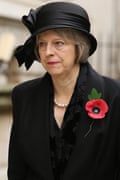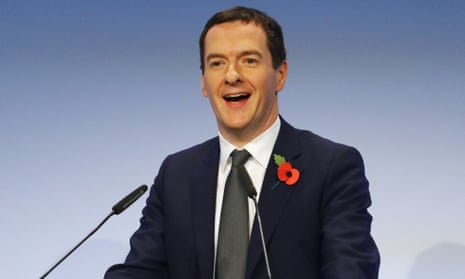Four government departments have agreed deep spending cuts of 8% a year for the next four years, George Osborne will announce.
The Treasury and the Departments of Transport, Environment, and Communities and Local Government are the first ministries to agree cuts in a spending review intent on slashing £20bn from the cost of government.
In a speech in London on Monday, Osborne will argue that controlling £4tn of government spending over the next five years is essential to guarantee national and economic security.
By naming the four departments that have reached a provisional agreement with the Treasury before the full results of the spending review are revealed on 25 November, Osborne hopes to put pressure on ministers who are still resisting his demands for cuts in their departments.
Negotiations with Theresa May, the home secretary, who is worried about cuts to police budgets, and Iain Duncan Smith, the work and pensions secretary, who is reportedly threatening to resign rather than accept cuts to his universal credit programme, are said to be proving particularly difficult.
Philip Hammond, whose Foreign Office has one of the smallest budgets in Whitehall, is also understood to be digging in, claiming that embassies may have to close under some of the proposals for his department.

With spending on health, international development, schools and education are protected, budgets in other departments are particularly vulnerable.
In his speech, Osborne will say that the four departments have agreed cuts to current spending worth on average 8% a year for the next four years. Capital spending is not covered by these cuts.
“These savings will be achieved by a combination of further efficiencies in departments, closing low-value programmes, and focusing on our priorities as a country,” Osborne will say.
A Treasury source said further details of the impact of the cuts would be given when the spending review is announced with the autumn statement, but that Osborne believed the experience of the last parliament showed that “you can, by reform, get better results for less money with public services”.
Total government spending this year is due to reach almost £750bn. The Treasury said the cuts had to be seen in the context of the fact that the government would be spending about £4tn over the next five years.
Defending the need to bring the budget into surplus, Osborne will say that the government is still spending too much. “There is no economic security, there is no national security, there is no opportunity, when you lose control of the public finances,” Osborne will say.
“It is only when you control spending, and live within your means, that you can build a country with security and opportunity at its heart. And that’s what the spending review I will present will be all about.”
Osborne says under the government’s plans, the budget will be in surplus by 2019-20. “For the first time in a generation, Britain will be saving instead of borrowing; paying down our national debt share, rather than adding to it.”
Having reached a provisional settlement with the Treasury, Patrick McLoughlin, the transport secretary, Liz Truss, the environment secretary, and Greg Clark, the communities secretary, will be allowed to join the government’s public expenditure committee as it imposes cuts on the departments still holding out.
Greg Hands, the chief secretary to the Treasury, is due to hold talks with ministers from those departments yet to settle this week.
Also echoing the security theme of the Tories’ election campaign, David Cameron will use a speech to the CBI on Monday to claim that the spending review is about “putting the security of British families first”.
He will say: “By finishing the job of repairing our finances, we are able to provide economic security for working families at every stage of their lives.
“It’s good news that today we can confirm four departments have provisionally completed their spending settlements. By making the further savings we need over the course of this parliament we can prioritise what matters for working families – schools, the NHS and our national security.”
Labour’s shadow chancellor, John McDonnell claimed Osborne was trying to isolate the work and pensions secretary, Iain Duncan Smith, in the spending review.
“The big question that the people are asking the chancellor today is over the security of their incomes, and that if he’ll go ahead with tax credit cuts of £1,300 a year on average.
“The real test for the Tories’ spending review is whether it makes working people better off and ensuring a more balanced, prosperous economy which works for everybody. The chancellor’s record to date is a disappointing one of cutting investment to the lowest of any developed economy, and the slowest economic recovery on record.”

Comments (…)
Sign in or create your Guardian account to join the discussion